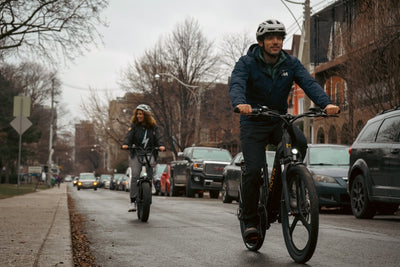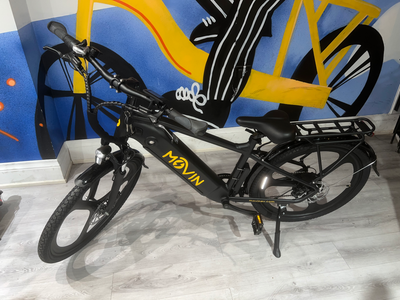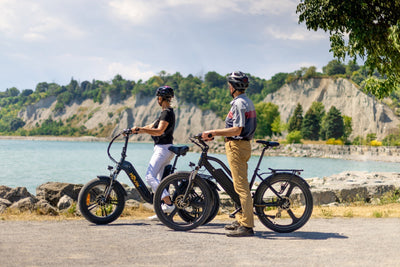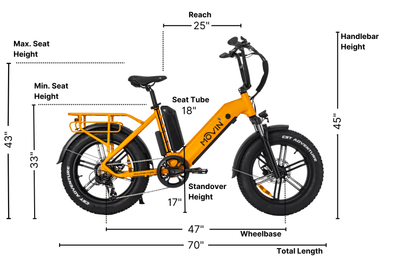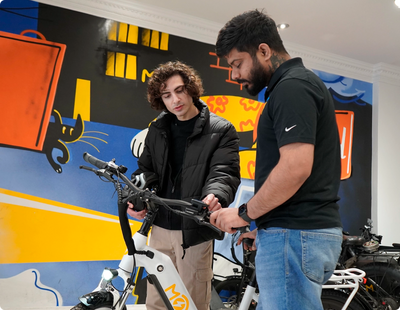Commuting distances in Toronto often lead to several problems, primarily due to traffic congestion and the sheer number of people traveling at the same time. Long distances, especially from suburban areas to city centers, result in extended travel times, with commuters often spending hours in traffic or waiting for public transportation. This time drain not only affects productivity but also contributes to stress and fatigue, as individuals sacrifice personal time for commuting. Additionally, longer distances increase transportation costs, whether it's for fuel, public transit fares, or vehicle maintenance. Environmental impacts are another concern, as more vehicles on the road lead to higher emissions and air pollution, further exacerbating urban living challenges.
E-Bikes: The Ideal Solution for Commuting Distances
Avoid Traffic Congestion
- E-bikes can use bike lanes and paths, bypassing traffic jams and reducing commute times.
Consistent Commute Times
- With less dependence on road traffic, e-bikes offer more reliable and predictable travel times.
Suitable for Short to Medium Distances
- Ideal for commutes between 5 to 15 miles, covering the average urban commuting distance efficiently.
Pedal-Assist for Easy Rides
- Pedal-assist feature makes longer distances manageable without excessive physical effort.
Cost-Effective
- E-bikes are cheaper to operate than cars, with lower fuel, parking, and maintenance costs.
Eco-Friendly
- E-bikes produce zero emissions during use, helping to reduce urban air pollution.
- E-bikes require minimal space and can be parked almost anywhere, eliminating parking issues.
Health Benefits
- Commuting by e-bike promotes light physical activity, improving fitness while reducing stress.
Flexible Routing
- E-bikes can navigate narrow streets, alleys, and other routes inaccessible to cars, offering more route options.
Sustainability
- Powered by electricity, often chargeable from renewable energy sources, e-bikes are an eco-conscious commuting choice.
Understanding the Challenges of Traditional Commuting Methods
Traditional commuting methods, such as driving cars or using public transportation, come with several challenges that impact both individuals and urban environments. Driving in congested cities often results in long delays, unpredictable travel times, and high levels of stress due to traffic jams and the search for parking. Public transportation, while more environmentally friendly, can also be unreliable, with delays, overcrowding, and limited route flexibility. Additionally, both methods can be costly, with expenses related to fuel, parking, maintenance, or transit fares. These traditional approaches also contribute to urban air pollution and environmental degradation, making the daily commute not only time-consuming but also detrimental to overall well-being and sustainability.
Why E-Bikes are Perfect only for Short to Medium Distances
E-bikes are perfect only for short to medium distances due to limitations in battery range, speed, and comfort. While they excel at trips between 5 to 15 miles, e-bikes typically offer a range of 20 to 70 miles on a single charge, which can be insufficient for longer journeys without frequent recharging. Additionally, their maximum speeds—often capped at around 20 to 28 mph—are ideal for urban environments but may not be practical for long-distance travel on highways or roads with higher speed limits. Over longer distances, the lack of advanced comfort features like full suspension or high-speed stability can also make the ride less comfortable. For these reasons, e-bikes are best suited for short to medium commutes, where their range, speed, and versatility shine.
Speed Meets Comfort: The E-Bike Advantage
| Aspect | Cars | Traditional Bikes | E-Bikes | E-Bike Advantage |
|---|
| Speed | High speed on highways but slows down in traffic | Limited by physical effort, average speed 10-15 mph | 20-28 mph with pedal-assist or throttle | Faster than traditional bikes, comparable to cars in cities |
| Traffic Navigation | Often stuck in traffic, especially in urban areas | Can bypass traffic but slower on longer routes | Can bypass traffic using bike lanes and paths | Moves through traffic easily without congestion issues |
| Effort Required | Minimal, but entirely passive | Requires significant physical effort, especially uphill | Minimal effort with pedal-assist, can engage throttle | Offers a low-effort ride, ideal for daily commutes |
| Range | Unlimited with fuel, but traffic affects travel time | Dependent on physical stamina | 20-70 miles per charge depending on battery | Great for medium distances, less tiring than traditional bikes |
| Comfort | Comfortable seating, air conditioning, climate control | Limited comfort, especially on longer rides | Comfort-oriented, with padded seats and upright riding posture | More comfortable than traditional bikes, especially for longer rides |
| Ride Stability | Stable at high speeds, but difficult in traffic jams | Stable but requires rider skill on rough terrain | Stable, especially with mid-drive motors and suspension | Balance of comfort and stability even on uneven terrain |
| Maintenance | High maintenance costs (fuel, servicing, repairs) | Low cost but frequent tire checks and chain maintenance | Low maintenance compared to cars, mainly battery and tires | Cheaper to maintain than cars, easier than traditional bikes |
| Parking | Limited, expensive in urban areas | Easy but bike racks can fill quickly | Minimal parking space required, easy to lock anywhere | Convenient parking, avoids high costs of car parking |
Comparing Travel Times: E-Bikes vs. Walking and Traditional Biking
When comparing travel times, e-bikes significantly outperform both walking and traditional biking, making them an ideal choice for short to medium-distance commutes. While walking typically averages around 3 to 4 miles per hour, resulting in longer travel times for distances as short as a mile, traditional biking averages about 10 to 15 miles per hour, which is faster but can still be physically demanding, especially on longer routes or hilly terrain. In contrast, e-bikes can achieve speeds of 20 to 28 miles per hour with minimal effort due to their pedal-assist feature. This allows riders to cover greater distances in less time while avoiding the fatigue associated with traditional biking. For instance, a 5-mile trip would take about 15-20 minutes on an e-bike compared to 30-50 minutes on a traditional bike and over an hour if walking. This efficiency not only enhances the commuting experience but also encourages more people to choose cycling as a viable transportation option.
The Low-Effort Factor: Enjoying Your Commute
The low-effort factor of e-bikes transforms the commuting experience into a more enjoyable and accessible activity. Unlike traditional bikes, which require significant physical exertion, e-bikes feature pedal-assist technology that makes it easier to tackle hills, cover longer distances, and navigate through urban environments without arriving fatigued or sweaty. This means commuters can enjoy the fresh air and scenery without the physical strain typically associated with cycling. Additionally, e-bikes provide the flexibility to adjust the level of assistance based on personal fitness and comfort, allowing riders to choose how much effort they want to exert. As a result, e-bikes not only make commuting more comfortable but also encourage more people to opt for cycling over driving, leading to a healthier lifestyle and a more enjoyable start to the day.
Reducing Traffic Congestion Through E-Bike Adoption
Reducing traffic congestion through e-bike adoption presents a promising solution to urban mobility challenges. As more commuters turn to e-bikes for short to medium distances, the number of cars on the road diminishes, alleviating the strain on congested urban streets. E-bikes can utilize dedicated bike lanes and paths, allowing riders to bypass traffic jams and reach their destinations more quickly. This shift not only eases congestion but also encourages a healthier and more sustainable mode of transport, as e-bikes produce zero emissions during use. Furthermore, by providing a convenient and efficient alternative to driving, e-bikes can reduce the demand for parking spaces in crowded areas, freeing up valuable urban real estate. As cities implement infrastructure to support e-bike usage—such as charging stations and expanded bike lanes—the overall transportation network becomes more efficient, benefiting all road users and contributing to a cleaner, more livable urban environment.
E-Bikes as a Solution for Overcrowded Roads
E-bikes serve as an effective solution for overcrowded roads, addressing the pressing issue of urban congestion. By encouraging commuters to switch from cars to e-bikes for short to medium distances, cities can significantly reduce the number of vehicles on the road, leading to less traffic and shorter travel times. E-bikes can navigate through dedicated bike lanes and paths, allowing riders to bypass congested areas and maintain a steady pace, which is often impossible in car traffic. This not only helps alleviate bottlenecks but also enhances the overall flow of transportation in urban settings. Moreover, e-bikes promote eco-friendly commuting, as they produce zero emissions, contributing to cleaner air and reduced environmental impact. As cities invest in e-bike infrastructure—such as charging stations, bike-sharing programs, and expanded bike lanes—e-bikes become a viable alternative to traditional vehicles, fostering a more sustainable and efficient transportation ecosystem while mitigating the challenges of overcrowded roads.

